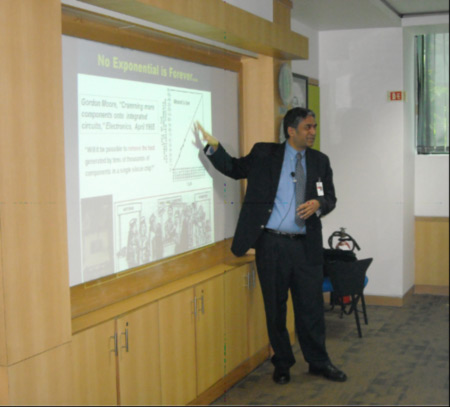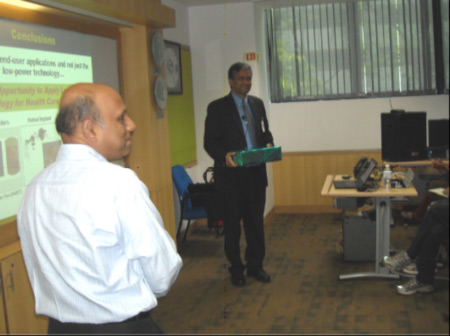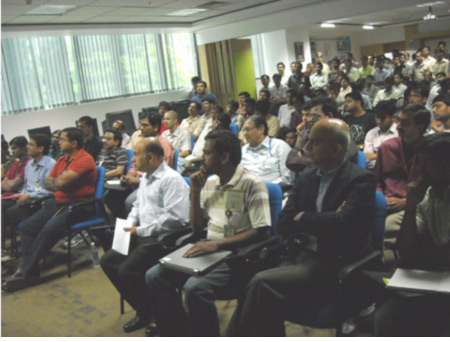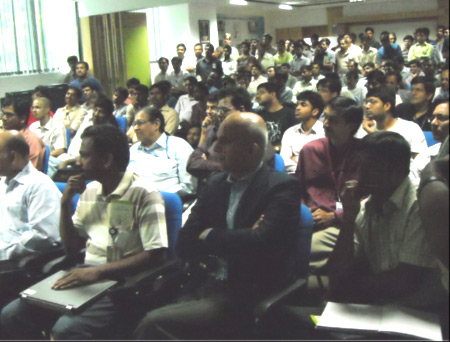
EVENTS 2005 - PRESENT
Back to
VSI Activities Photo Gallery VSI Events
Next-Generation Ultra-Low-Power System Design
Texas Instruments India, Bangalore, 28 April 2011
Organized by: PragaTI (TI India Technical University) in collaboration with IEEE Circuits and Systems Society, Bangalore Chapter and VLSI Society of India
Speaker: Anantha P. Chandrakasan (Joseph F. and Nancy P. Keithley Professor of Electrical Engineering, Director, MIT Microsystems Technology Laboratories)
|
About the seminar:
Prof. Anantha Chandrakasan of Massachusetts Institute of Technology delivered a seminar which outlined the trends of things to come in the area of low-power electronic systems. The area of semiconductors has matured, he pointed out. This may be a controversial statement to make, but I feel the next generation of innovations will come not at device-level or circuit-level, but at system-level of abstraction. The seminar was organized by PragaTI (TI India Technical University) in collaboration with VLSI Society of India and IEEE CAS Bangalore Chapter. The seminar took place at Texas Instruments, Bangalore campus and was attended by more than 150 participants who packed themselves into the seminar room – some stood and others squatted on the floor. The audience included members of VSI, IEEE, and employees of semiconductor companies in Bangalore. |
|
 "No exponential is forever," says Prof. Anantha Chandrakasan |
 C.P. Ravikumar, Secretary of VSI and CAS Bangalore Chapter, thanked the speaker at the end of the seminar for an excellent and inspiring seminar. |
Since the next-generation handheld devices and wireless sensors for health and environmental monitoring will require dramatic reduction in energy consumption, we will have to power these devices using energy-harvesting techniques such as vibration-to-electric conversion, or through body heat, said Prof. Chandrakasan. We will have to use a system-level approach to optimize such devices. He illustrated this with several examples of systems built at MIT Microsystems Technology Labs. Some of the system-level considerations include ultra-low-voltage digital circuit operation, application-specific digital and mixed-signal architectures, extreme parallelism, computation vs. communication trade-off, and integrated energy-processing circuits, explained Prof. Chandrakasan. While we have heard of digitally assisted analog circuits, there will be a case for analog-assisted digital circuits such as embedded switched capacitor power management, and offset compensation in sense amplifiers in order to deal with device variability and low-voltage operation. He described some circuits where device variability has been exploited for low-power operation. |
|
 Over 150 participants took part in the Seminar by Prof. Anantha Chandrakasan |
 A packed seminar room for Prof Anantha Chandrakasan’s seminar |
|
At the beginning of the seminar, Dr. C.P. Ravikumar, secretary of VSI and IEEE CAS Bangalore Chapter, welcomed everyone to the seminar and introduced Prof. Chandrakasan. Anantha P. Chandrakasan received the B.S, M.S. and Ph.D. degrees in Electrical Engineering and Computer Sciences from the University of California, Berkeley, in 1989, 1990, and 1994 respectively. Since September 1994, he has been with the Massachusetts Institute of Technology, Cambridge, where he is currently the Joseph F. and Nancy P. Keithley Professor of Electrical Engineering. He is the Director of the MIT Microystems Technology Laboratories (MTL) which has over 700 users. The feedback for the seminar has been excellent – it received an overall rating of 4.73 out of 5.0. Qualitative comments included, It was an awe-inspiring seminar, Truly inspirational talk, etc. |
|